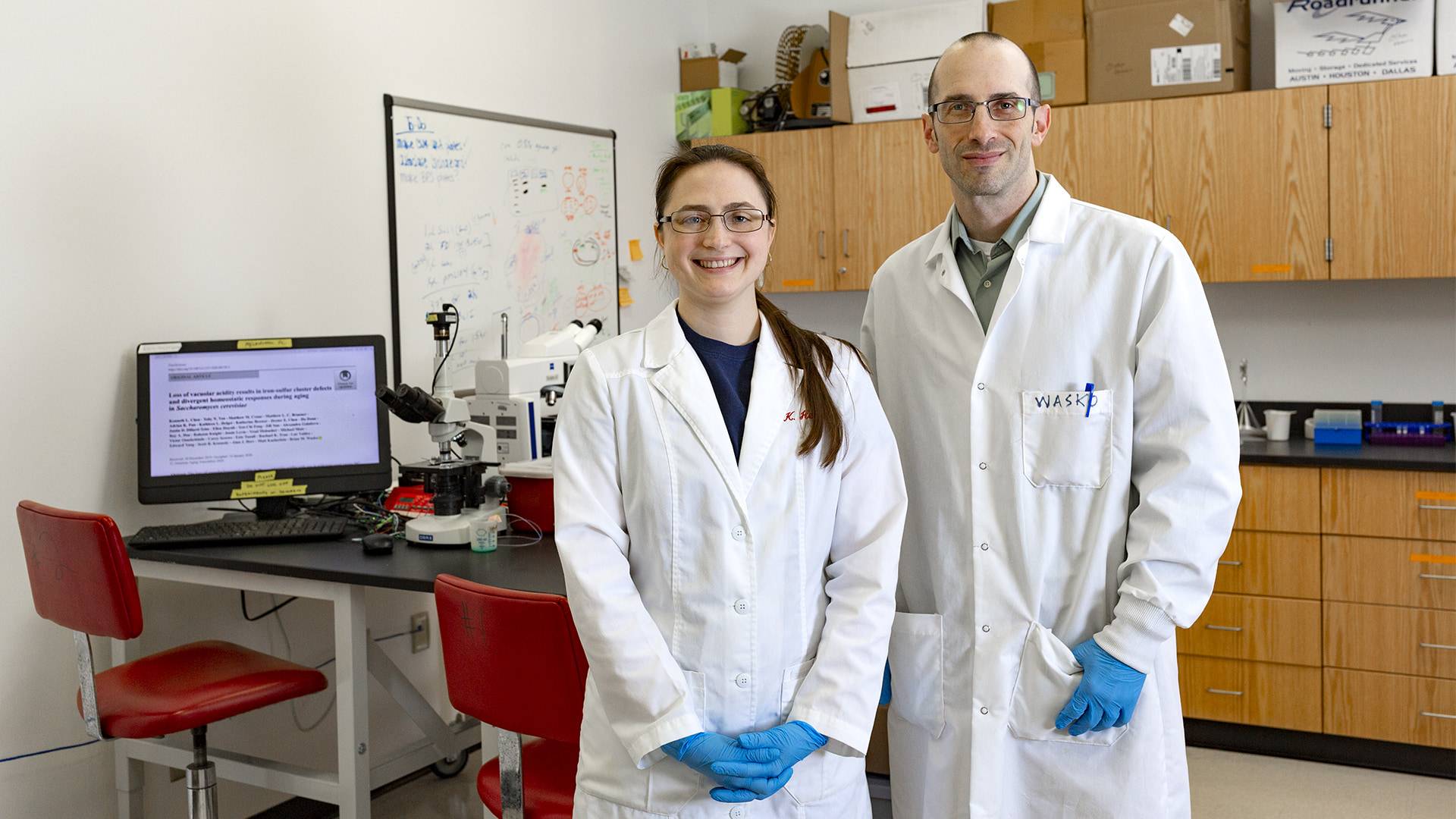UHCL prof, research assistant, collaborate on article on aging
March 2, 2020 | UHCL Staff
University of Houston-Clear Lake Assistant Professor of Biology and Biotechnology Brian M. Wasko and his research assistant Kathleen Helget, have co-authored an article on the molecular
mechanisms of aging, published in January in the scientific journal GeroScience.
“There’s a significant rationale for research in geroscience, or the study of aging,”
Wasko said. “Most of the diseases that people suffer from in developed countries are
associated with aging. Cardiovascular disease and cancer are the major causes of death,
and the risk of getting these diseases increases exponentially with age. Instead of
treating just cancer or just Alzheimer’s, we could potentially target the aging process
itself, and perhaps reduce the incidence or delay the onset of all or many of these
age-associated diseases simultaneously.”
Wasko said that they used simple baker’s yeast to study aging. “Surprisingly, there
are at least some ways that yeast cells age similarly to mammalian cells. If you change
a gene in yeast and it lives longer, and you change the same gene in worms and flies
and they also live longer, then you might be able to modulate the same gene in humans
to get them to live longer,” he said. “Because of the simplicity of yeast, we can
study aging quickly, and yet potentially learn insights about the aging process that
may be similar in our cells.”
A central research question they sought to answer is what is the potential sequence
of failure during aging. “Is it random? What fails first during aging, and why? From
that, our study found that one of the earliest problems is with the recycling center
of the cell. Normally, it’s acidic, but during the aging process, it loses its acidity,
which leads to problems with iron,” he said.
Helget, who received her bachelor of arts in English from another university in 2013,
came to UH-Clear Lake to complete the requirements needed to apply to medical school.
She said she began working in Dr. Wasko’s lab in October 2018.
“My contribution was to figure out the effect of iron on mutant cells, so I did a
viability spot-test, which means I put yeast into an environment to see if it would
grow,” she said. “It did grow along with the iron. That further solidifies our research,
which showed that iron rescues a mutant cell. If you have a cell that loses its acidity,
an increase in iron will help rescue it.”
She added that she’s completed her pre-med prerequisites and that her work in his
lab had made a significant impact on her medical school applications. “Letting medical
schools know that my research had been published got me three interviews at out-of-state
medical schools that I am considering,” she said. “I believe they paid more attention
to me because of this. They like to see you that you are doing research and that you
are published.”
Because her undergraduate degree was in English, she felt that she needed a lot of
extra mentoring. “I didn’t have the basic skills but I got them from working in this
lab and through Dr. Wasko mentoring me,” she said. “Working in this lab has been a
differentiator for me. I have not decided which medical school I’d like to go to,
but I know that I have options and I feel my training here has made me an attractive
applicant.”
Some of the research published in their article, Wasko said, was conducted in his
lab, but it was also a collaborative effort. “In terms of real-world applications
for our research, often the first step is just figuring things out. The applications
come later,” he said. “First we create the foundation, then we apply the knowledge.
We are understanding the basic biology of aging before intervening. If what we see
in yeast cells is also seen in human cells, it gives us a point of potential intervention
early in the aging process.”
Read more about UHCL’s Biology and Biotechnology program.
About the Author:
Recent entries by
October 18 2022
Better technology transforms campus safety: Police Chief demonstrates SafeZone to students
October 14 2022
Student's skill with drones takes chicken turtle research to new heights
October 11 2022
Planting event to help UHCL restore native plants to campus, support environmental sustainability







